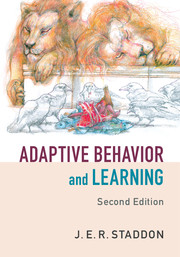Book contents
- Frontmatter
- Contents
- Preface to the second edition
- Acknowledgments
- 1 The evolution, development, and modification of behavior
- 2 Variation and selection: kineses
- 3 Reflexes
- 4 Direct orientation and feedback
- 5 Operant behavior
- 6 Reward and punishment
- 7 Feeding regulation: a model motivational system
- 8 The optimal allocation of behavior
- 9 Choice: dynamics and decision rules
- 10 Foraging and behavioral ecology
- 11 Stimulus control and cognition
- 12 Stimulus control and performance
- 13 Molar laws
- 14 Time and memory, I
- 15 Time and memory, II
- 16 Template learning
- 17 Learning, I
- 18 Models of classical conditioning
- 19 Learning, II
- 20 Learning, III: procedures
- 21 Comparative cognition
- Index
5 - Operant behavior
Published online by Cambridge University Press: 05 March 2016
- Frontmatter
- Contents
- Preface to the second edition
- Acknowledgments
- 1 The evolution, development, and modification of behavior
- 2 Variation and selection: kineses
- 3 Reflexes
- 4 Direct orientation and feedback
- 5 Operant behavior
- 6 Reward and punishment
- 7 Feeding regulation: a model motivational system
- 8 The optimal allocation of behavior
- 9 Choice: dynamics and decision rules
- 10 Foraging and behavioral ecology
- 11 Stimulus control and cognition
- 12 Stimulus control and performance
- 13 Molar laws
- 14 Time and memory, I
- 15 Time and memory, II
- 16 Template learning
- 17 Learning, I
- 18 Models of classical conditioning
- 19 Learning, II
- 20 Learning, III: procedures
- 21 Comparative cognition
- Index
Summary
Some behavior makes sense in terms of the events that precede it; other behavior makes more sense in terms of the events that follow it. Reflexes are behavior of the first kind. The type and vigor of the reflex response are closely related to the type and intensity of the eliciting stimulus. Kineses are behavior of the second kind. The movement of the orienting bacterium from moment to moment is unrelated to any single stimulus, yet its behavior as a whole can be understood in relation to the prevailing chemical gradient: The organisms aggregate in high concentrations of an attractant and disperse away from concentrations of a noxious substance.
Behavior like this is guided by its consequences: Under normal conditions, the location of the bacterium is determined by the chemical gradients in its environment. Because the antecedent (proximal) causes of its behavior are many but the final cause is one, we can most simply describe the behavior in terms of its outcome: The bug finds the food.
Operant behavior and B. F. Skinner
Behavior guided by its consequences was called operant behavior by B. F. Skinner, and the term has stuck. The word operant refers to an essential property of goal-directed behavior: that it has an effect on the environment. If the bacterium cannot move, or if movement has no effect on the organism's chemical environment, then its behavior will not appear to be guided by a goal.
Skinner in his various writings has used the term operant behavior in three senses: (a) by exclusion, as behavior that is not tied to an eliciting stimulus. It is, if not spontaneous, at least behavior for which “…no correlated stimulus can be detected upon occasions when it is observed to occur.” (b) As behavior involving units, operants, defined by the correlation between stimulus and response. Skinner argued that both stimulus and response are classes of events, and the definition of each class is an empirical matter: Each should be defined in terms of the other so that the elements show “orderly changes” as a function of relevant variables. A stimulus becomes “that which causes a response,” and a response “that which is caused by a stimulus.” This kind of bootstrap definition may seem peculiar but is, in fact, quite characteristic of scientific theory generally.
- Type
- Chapter
- Information
- Adaptive Behavior and Learning , pp. 102 - 134Publisher: Cambridge University PressPrint publication year: 2016



